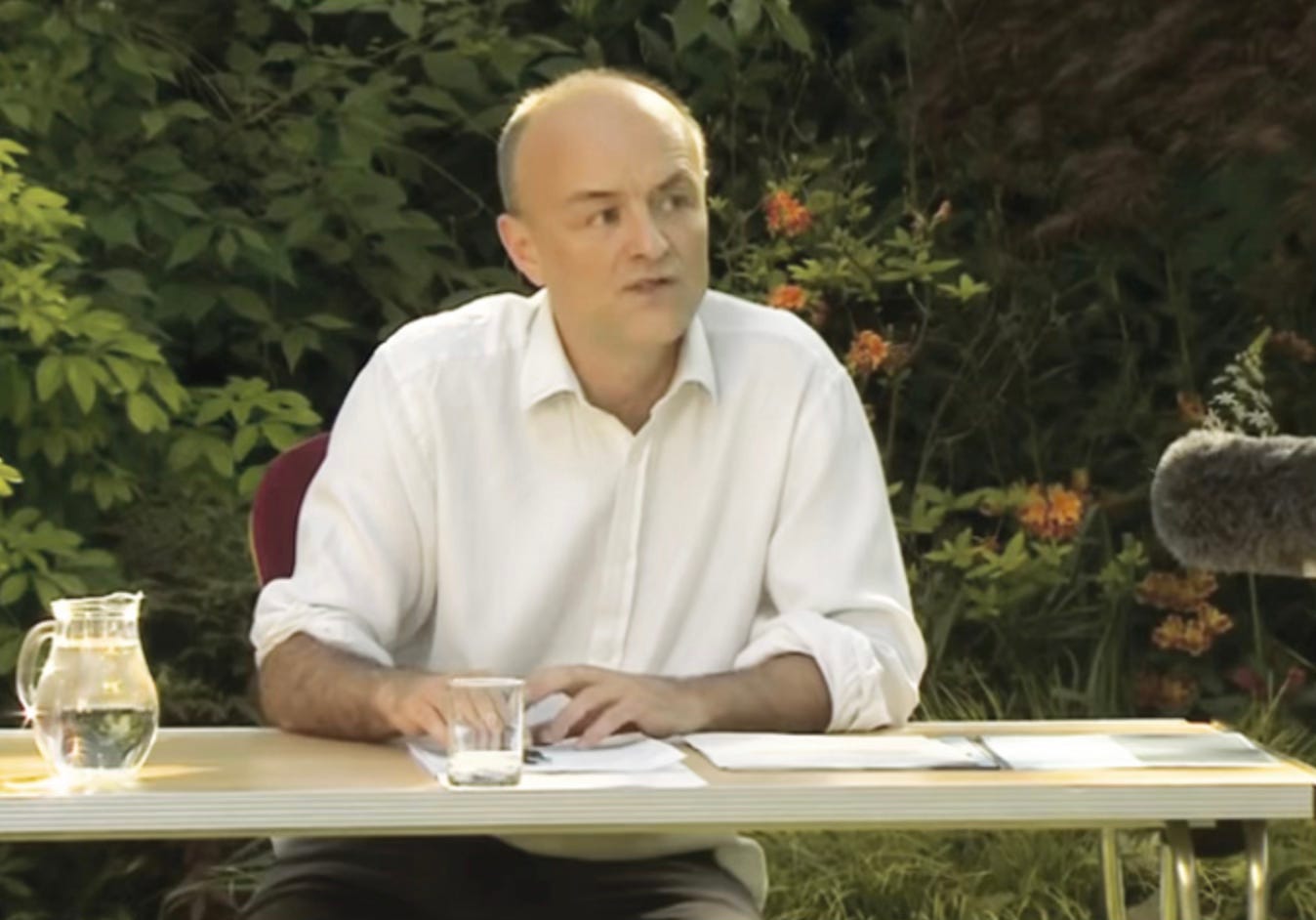Part 12: The Proto-Miller of Whitehall: Dominic Cummings, Farage, and the Long War to Rewire Britain
This essay is part of our ongoing series, The Dark Enlightenment: The Gospel According to Power - an investigation into how faith, technology, and ideology merge to justify authoritarian power.

Dominic Cummings is back sniffing around politics, and like a fox that once raided the coop, he thinks no one remembers whose teeth were on the neck of the country the last time he got inside.
We remember. In fact, this entire project - Notes from Plague Island - was born in the toxic fog of the Cummings-Johnson years. While Boris flailed at the wheel, it was Cummings who wrote the sat-nav instructions, cheering on chaos as if governance were just another game of psychological warfare staged for his amusement. He treated Britain like a beta test; we got the herd immunity briefings and the Barnard Castle eye exam. He walked away. We got stuck living in the wreckage.
So, let’s be clear: when we read his latest interview in The Times, we didn’t see a political analyst offering tough love to Reform UK. We saw Dominic Cummings doing what Dominic Cummings always does: slithering back toward the heat of power, pretending he doesn’t want it while quietly auditioning to take control of it.
The sneering remarks about Nigel Farage “exploding” on contact with Whitehall aren’t warnings (Swinford, 2025). They’re bait. A smirk wrapped in strategic invitation. The underlying message is pure Dom: Your rage could go further with a real strategist. Fortunately for you, I happen to speak fluent bureaucracy.
He isn’t a populist. He isn’t a nationalist. He’s something else: a proto–Stephen Miller who wants a strongman to smash the glass so he can rewire the control panel afterward. Not a torch-carrying fascist, but a techno-authoritarian engineer who dreams of replacing democratic process with algorithmic obedience and ‘disruptive weirdos’ who answer only to his vision of the future.
Farage can whip up a mob. Cummings can weaponise a state.
And if you know his history, as we do, this interview doesn’t read as commentary. It reads like a love letter disguised as contempt, addressed to Reform UK’s leader from an unelected kingmaker desperate for a new host.
Nigel, darling. You’re going to blow up when you meet Whitehall. Good news: Daddy Dom knows where the wires are.
Dominic Cummings as a Political Parasite, Not a Political Ally
Dominic Cummings has never served anyone but Dominic Cummings. He doesn’t believe in movements; he believes in leverage. He doesn’t crave popularity; he craves proximity to the machinery of power. And he certainly doesn’t do loyalty. When a host becomes inconvenient, too slow, or too stupid to execute his vision, he molts and moves on.
He wasn’t ‘Boris Johnson’s strategist.’ He was merely using Johnson as a political battering ram to break into the state apparatus. Once inside, he tried to reshape Whitehall in his own image: tearing down checks, loosening the safeguards, and promoting “weirdos and misfits” (Cummings, 2020) so long as they worshipped at the altar of disruption. When Johnson began drifting off-script and became more interested in Thatcher cosplay and wallpaper than state reconstruction, Cummings ditched him with all the sentiment of a man deleting an app that drains too much battery.
He sees human beings as interchangeable delivery systems for his vision. Johnson was a vessel. Gove was a prototype. Vote Leave was a launchpad. The pandemic briefings were a petri dish. Now Reform UK is starting to look like a fresh incubator with just enough chaos for him to re-enter the bloodstream.
Cummings isn’t the populist messiah Farage thinks he is. He’s the lab-coated cynic standing just out of shot, clipboard in hand, observing how long it takes a demagogue to burn out without a strategist to guide him through the wiring of the state. Farage growls at the establishment; Cummings wants to gut it and rebuild something colder, sharper, and less democratic in its place.
Every time he leaves a campaign or government, the same pattern emerges: scorched earth behind him, vague manifestos about the future of statecraft, and a sense that he never wanted to lead a revolution - he wanted to control the revolutionaries.
That is what makes him dangerous. Farage is fire. Cummings is accelerant.
So, when he hovers once more at the edges of power, mockingly diagnosing yet another leader’s limitations, don’t mistake it for detachment. This is stage one of his parasitic cycle: contempt first, infiltration second, system rewrite third.
The Proto–Stephen Miller of Whitehall - Learning from Trump’s Authoritarian Second Act
Stephen Miller is no longer just the ghost in Trump’s first-term machine. Under Trump’s second presidency, he has stepped out of the shadows and into full ideological visibility; the bureaucratic sadist turned officially sanctioned architect of nationalist statecraft. No longer just whispering in corridors, Miller’s fingerprints are now openly stamped across U.S. policy, from enhanced deportation regimes to the restructuring of federal departments in the name of loyalty and ideological purity (Swan, 2024).
Cummings isn’t at Miller’s level yet, but he is unmistakably trying to follow the same arc. Like Miller, he despises democratic drag. He sees elected leaders as blunt instruments who exist to enact the visions of unelected strategists smarter than the electorate. Like Miller, he dreams not of leading a populist uprising, but of disciplining one into a new kind of state machinery. And like Miller, he sees anger as a resource, not a danger, provided it is properly harnessed, optimised, and steered by those who understand the system.
Where Miller used immigration as his weapon of bureaucratic terror, Cummings obsesses over the civil service, convinced that Whitehall must be broken apart and rebuilt with faster decision-making structures, AI-driven predictive models, and elite rule by cognitive superiority (Cummings, 2019). His blog posts read less like policy and more like manuals for future techno-authoritarian statecraft, filled with references to DARPA-style centralised control systems and surveillance-optimised governance models (Helm & Hinsliff, 2019).
If Miller believes government should punish the weak, Cummings believes government should be stripped of friction so the chosen few can impose their will at scale. Both men position themselves in the same ideological caste: the cold operative who needs a charismatic frontman. Miller has Trump. Cummings is still auditioning for his candidate.
Trump 2.0 has now fully validated the career path of the bureaucratic authoritarian. The lesson isn’t subtle: stick around long enough, anchor yourself to the right demagogue, and what once looked like fringe extremism becomes normalised governance. Cummings will have taken note.
Nigel Farage, with his MAGA karaoke and Trumpist echoes, may be precisely the kind of populist lightning rod Cummings is waiting to wire into a British-style authoritarian upgrade. In Trump’s America, Miller has gone from whispering devil to public architect. Cummings clearly wants his own Whitehall equivalent of that legacy; a claim not just to influence, but to authorship.
His vision does not require jackboots. It requires a frontman to win the crowds, and a strategist waiting behind him with a new operating system for the British state.
Brexit as Beta Test - His First Assault on Whitehall
Before Dominic Cummings began circling Reform UK like a vulture waiting for Reform’s first serious organ donor, he had already conducted his first major live experiment: Brexit.
Brexit was never his ideological passion. It was his laboratory. The referendum was less about sovereignty than strategy - proof that mass psychology, data harvesting, and incendiary messaging could be algorithmically weaponised to bend a nation (Shipman, 2016; Cadwalladr, 2018). “Take Back Control” was not a patriotic rallying cry so much as a behavioural science experiment in dopamine-triggered populism. The public thought they were part of a democratic uprising. In reality, they were part of Cummings’ first large-scale simulation.
Once that test succeeded, he didn’t bask in nationalist glory. He went straight to redesigning the state. Johnson was merely the keycard he used to break into No.10 (Heffer, 2020). From there, he began the next phase: purging what he saw as the soft, sluggish, consensus-driven civil service and attempting to replace it with a new structure shaped around speed, hierarchy, and algorithmic decision-making.
He was explicit about this mission. In internal memos and public blog posts, he raged at “the blob” - his catch-all insult for a technocratic establishment too bound by institutional safeguards and legal constraints (Walker, 2020). He called for a “high performance government” powered by “cognitive technologies,” AI modelling, and elite special advisers drawn from physics, computer science, and military strategy (Cummings, 2019). He pushed for a UK version of the U.S. Defense Advanced Research Projects Agency (DARPA), which he believed could bypass slow-moving bureaucratic processes and make rapid, disruptive interventions in national infrastructure and governance (Helm & Hinsliff, 2019).
Barnard Castle was a revelation as well as a scandal. It showed that Cummings believed certain people (read: himself) operated above the rules that bind ordinary citizens (Weaver, Dodd, and MacInnes, 2020). It exposed his worldview: systems exist to be manipulated, not followed. Accountability is an inefficiency. Public outrage is a distraction to be weathered until focus shifts to the next news cycle.

His departure from No.10 was not a moral break or a principled resignation. It was the collapse of a host too weak and too vainglorious to sustain his project. Johnson wanted legacy. Cummings wanted control. The moment Johnson drifted into a mix of Thatcher tribute act and interior design cringe, Cummings discarded him like an obsolete phone.
Brexit was the trial run. Johnson was the prototype host. Whitehall was the testing ground. The system did not break fully, but it shook. Now, in Farage and Reform UK, Cummings appears to see the possibility of a second attempt, but this time with a host more willing to bulldoze democratic norms and more aligned with the Trump-Miller doctrine of loyalist governance.
The first assault cracked the shell.
The next one will aim to reprogram the inside.
Subscribe to Notes From Plague Island and join our growing community of readers and thinkers.
Why Farage Is the Perfect Second Attempt
Nigel Farage is not a strategist. He is a mood with a face. A professional grievance salesman who has built an entire political career on emotional impact without ever bothering to produce a serious machinery-of-government blueprint. For years, he has been the loudest man in the room without any intention of reading the manual once he gets the keys. That is exactly what makes him so attractive to Dominic Cummings.
Reform UK exists in a permanent state of anti-establishment combustion. It knows how to bark ‘betrayal,’ ‘globalists,’ and ‘broken Britain,’ but has no credible plan for how to run a state. It flirts with power without understanding it; a populist party longing for a strongman fantasy imported from Trump’s America, complete with flag-heavy studio sets and rhetoric about ‘draining the swamp,’ without any capacity to operate once the swamp starts asking for budget lines and statutory instruments.
That is where Cummings sees an opening. In Trump’s second-term America, Stephen Miller’s doctrine of bureaucratic authoritarianism has gone mainstream: policy is now openly shaped around ideological loyalty, punitive governance, and efficiency framed as moral duty (Rucker & Leonnig, 2024; Swan, 2024). Farage, who idolises Trumpism with all the originality of a franchise pub copying an American dive bar from TikTok, desperately needs someone who knows how to operationalise authoritarian ambition within Westminster. Cummings, ever the opportunist, sees the chance to elevate himself to Britain’s Miller, the man who turns posturing into program.
His line about Farage “exploding” on contact with Whitehall is a diagnosis followed by an implied offer of treatment (Swinford, 2025). The unspoken second half of that sentence might as well be: You don’t know how to operate the system. Luckily for you, I do. It’s power-negotiation 101: diminish the populist to create dependency, then step in as his indispensable operator.
And let’s be clear: Farage would lap it up. He has always presented himself as the insurgent everyman but secretly craves the legitimacy of statecraft. He has the ego to want a Miller. Someone to whisper that he is not just a broadcaster in a blue suit shouting about migrants - he is a potential Trump 2.0, ready to reshape Britain forever provided he has the right strategic mind behind him.
Cummings has spent his career looking for a frontman willing to detonate the old order in exchange for prestige and adoration. Johnson failed because he was too vain and too unserious. Farage may fail for similar reasons, but he is now surrounded by Trumpist energy and powered by a voter base radicalised by economic despair and anti-system rage. This time, the host is already ideologically primed for authoritarian mutation.
If Cummings sees Farage as his next vessel, it is not because he believes in the man. It is because Farage is a hollow megaphone screaming for structure. Reform UK is a shell waiting for a doctrine. Dominic Cummings has one ready to upload.
DOGE Dreams and the US Blueprint: Reform as Britain’s MAGA 2.0
Reform UK is not an original political project. It is a Pound Shop version of MAGA - all of the noise, none of the architecture. That’s precisely what makes it ripe for someone like Dominic Cummings: a party powered by vibes and outrage, desperate for a governing blueprint that doesn’t just sound like America’s second-term authoritarian experiment, but operates like it.
In Trump’s second term, the so-called Department of Government Efficiency (DOGE) has become a symbolic flagship for Millerite governance: an administrative reshaping project masquerading as streamlining while actually functioning as a loyalty-enforcement system (Rucker & Leonnig, 2024). Under the DOGE doctrine, government departments are expected to align with the ideological will of the ruling executive. Miller’s influence lies in fusing cruelty with bureaucracy: weaponising state structures not merely to exclude, but to punish.
Farage, who has always admired Trump’s ability to turn resentment into political electricity, would love nothing more than a British equivalent of DOGE; a state purged of what he calls ‘woke bureaucrats,’ remade to serve the imaginary ‘real Britain’ of his speeches. Indeed, in Reform-led councils in the UK, they’re already started to implement DOGE-style governance. So far, this has largely been unsuccessful because Farage has no plan beyond TV soundbites and pub-chat one-liners. What he needs is someone who actually understands how to gut and rebuild a government machine.
Cummings has openly fantasised about doing exactly that since at least 2019, when he published lengthy digital treatises on high-speed governance, AI-led decision models, and elite-driven state accelerationism (Cummings, 2019). Where Farage wants headlines, Cummings wants hydraulic control. He thinks in systems, code, pressure points. If Farage sees the civil service as an enemy army to be insulted on GB News, Cummings sees it as legacy software to be replaced with a faster, more obedient operating system; one where only the cognitively ‘fit’ remain at the console.
And this is precisely why Trump’s second term matters for Britain. Miller has proven that a populist frontman can be retrofitted with a bureaucratic regime that outlasts his slogans. DOGE is the model of post-democratic governance, where a charismatic leader draws the crowd, while a technocratic authoritarian quietly rewires the state behind him.
Reform UK does not yet have that technocrat. But Cummings is already circling. He doesn’t want to be Farage’s sidekick. He wants to become his Miller, shaping the machinery of government in his own image, leaving Farage to play king while he redefines the kingdom.
In MAGA 2.0, Miller has stepped into the spotlight. In a possible Farage 2.0, Cummings is waiting for his cue.
The “NPC PM” Line: Diagnosis as Recruitment Strategy, Not Commentary
When Dominic Cummings called Keir Starmer an “NPC PM,” (Swinford, 2025) it was an insult as well as a signal flare to the disillusioned right that the country is currently being run by a placeholder. In gamer culture, an ‘NPC’ (Non-Playable Character) is a background figure programmed with limited responses, incapable of independent thought. In Cummings’ framing, Starmer is not a leader, but an empty suit executing command prompts generated by committees, institutional inertia, and polling data.
Regrettably, to a certain degree, he’s right. Starmer governs as if the goal of politics is not change but stability management. His managerial centrism is bloodless, scripted, and entirely reactive (Mason, 2024). He leads like a man afraid of the consequences of leading. His brand of politics treats crisis as a thing to be quietly administered rather than confronted. That hollowness creates a vacuum where stronger ideologues circle like sharks. Cummings can smell the political blood in the water.
But Cummings did not throw the NPC insult simply to humiliate Starmer. He deployed it as part of a recruitment logic for the next phase of his project. In his taxonomy of political actors, Starmer’s NPC status signals two things:
The regime currently has no author. It is ruled by autopilot, and autopilot regimes are ripe for takeover.
A charismatic populist could easily seize momentum on the back of this vacancy. And once that figure arrives, they will need a strategist who understands how to exploit bureaucratic weakness.
Farage’s followers will have heard the NPC comment as confirmation of what they already believe: Britain is run by drones. Cummings wants them to take the next step: drones can be overridden by someone who understands system control.
This positioning is an elegant setup for the argument that Britain is currently a state without a brain, needing one urgently. He is marketing himself as that brain: the one who knows how to accelerate the machinery while a populist holds the front of house.
The “NPC PM” line is more than mere mockery; it is the first line of a manifesto that says: “The players are weak. A stronger operational intelligence must emerge.” And in Cummings’ worldview, that intelligence is him, not leading from the podium, but coding in the basement.
A Cummings–Farage Fusion: Populist Charisma Meets Technocratic Control
On his own, Nigel Farage is all sound and fury, performed daily under studio lighting. On his own, Dominic Cummings is a resentful technocrat blogging into the void about physics PhDs, AI modelling, and ‘cognitive elites.’ Each has a missing half.
One is emotionally combustible but strategically hollow; the other is strategically obsessive but emotionally inert. Neither is capable of transforming Britain alone. But together, if Farage’s demagoguery were paired with Cummings’s data-driven authoritarianism, Reform UK could evolve from a grievance machine into a state-rewiring project with a pulse.
We’ve already seen what this formula looks like when it reaches maturity: Trump provides the cult energy; Stephen Miller designs the administrative noose (Rucker & Leonnig, 2024; Swan, 2024). In America’s second Trump term, this pairing has been institutionalised. Farage is desperate to replicate this success but lacks a Miller. Cummings appears eager to audition.
Make no mistake: Cummings is not interested in writing Reform UK’s manifesto. He is interested in writing its operating system. His vision extends beyond elections and seats because he dreams of changing how the system functions at its deepest levels: stripping out checks, accelerating decision-making under ‘emergency logic,’ privileging high-speed executive direction over parliamentary scrutiny (Cummings, 2019). Farage doesn’t think this way, but he wants someone who does.
Here lies the real danger: Cummings does not want to moderate Farage. He wants to weaponise him. Johnson attempted to use Cummings and later resented being controlled. Farage would be more likely to treat Cummings’s presence as validation; proof that he is now a serious statesman fit to lead a nationalist transformation of the state.
A Farage–Cummings axis would not resemble chaotic Brexit populism. It would be colder, sharper, more deliberate. The emotional appeal would be Farage’s, and the systematic purge would be Cummings’s. One sells the end of “the blob.” The other builds a new machine where only the cognitively approved are permitted to operate the controls.
This is precisely what makes this moment more dangerous than 2016. Back then, Brexit was an accident Cummings learned to ride. This time, the conditions are already primed by global authoritarian resurgence: Trump 2.0, Miller ascendant, Meloni stabilised in Italy, far-right breakthroughs across the EU, and a British electorate worn down by economic attrition and political vacancy.
A charismatic messenger and a cold architect. Rage fused with method.
This is how regimes are built.
Conclusion - The Return of the Strategist and the Unfinished War on the State
We have been here before. We watched Dominic Cummings once walk through the gates of Downing Street with Johnson as his grinning Trojan horse. We saw him revel in the chaos of crisis, intoxicated not with public service but with pure control. We lived through the consequences while he experimented with governance like a man running stress tests on a country he did not have to live in. When the fallout came - when trust collapsed, when bodies piled up, when the nation was gaslit into believing Barnard Castle was a reasonable ophthalmological choice - he didn’t stay to answer for any of it. He walked away, muttering that everyone else was too stupid to carry on without him.
He abandoned Britain mid-crash, then logged back on to insist the crash would have been glorious if only we’d let him fly the plane harder into the ground.
Now he is circling again, this time, not around a faded libertarian clown like Johnson, but around a nationalist broadcaster-turned-would-be-strongman who openly worships Trump’s authoritarian second act. And this time, the global conditions are even more combustible. Trump is back, Miller has stepped out of the shadows, authoritarian projects are no longer pretending to be glitches in democracy; they are positioning themselves as its replacement.
Cummings has always believed that Britain needs to be broken to be rebuilt in his image. The last time, he didn’t finish the job. This time, he may believe he has found a leader willing to go further than Johnson ever dared, someone who won’t flinch at purging institutions, weaponising bureaucracy, or rewriting the state around ideological loyalty and algorithmic obedience.
Together, Cummings and Farage would not simply aim to “take back control.” They would aim to define who controls, how control is coded, and who is erased in the process.
This is why we write about Cummings again. Not out of fascination, but out of memory. Notes From Plague Island was born in the smoke of Cummings’ first attempt at remaking Britain. It exists because we watched an unelected strategist treat a national trauma as a sandbox, then leave us drowning in the consequences.
We recognise the signs now. We know this scent. He is back at the edges of power, sniffing for a breach. And if Farage offers him the door, he will walk through it smiling, already drafting the next phase of his war on the British state.
The question is not whether Dominic Cummings still wants to rewire Britain. The question is whether we will let him finish this time.
Or support us with a one-off tip → Buy Me a Coffee
References
Cadwalladr, C. (2018) ‘“I made Steve Bannon’s psychological warfare tool”: meet the data war whistleblower’, The Guardian, 18 March. Available at: https://www.theguardian.com/news/2018/mar/17/data-war-whistleblower-christopher-wylie-faceook-nix-bannon-trum [Accessed 19 October 2025].
Cummings, D. (2019) ‘On the referendum #33: High performance government, cognitive technologies, the NHS, nuclear weapons – some thoughts on 2019-2069.’ Dominic Cummings Blog. Available at: https://dominiccummings.com [Accessed 19 October 2025].
Cummings, D. (2020) ‘Two hands are a lot – we’re hiring data scientists, project managers, policy experts, assorted weirdos….’ Dominic Cummings Blog. Available at: https://dominiccummings.com [Accessed 19 October 2025].
Helm, T. and Hinsliff, G. (2019) ‘Dominic Cummings: “We’ll be judged on whether we get Brexit done”’, The Observer, 28 July.
Mason, P. (2024) How Labour Lost its Fire: Starmerism and the Politics of Caution. London: Verso.
Rucker, P. and Leonnig, C. (2024) The Return: Trump’s Second Coming and the Men Who Shape It. New York: Penguin Press.
Swan, J. (2024) ‘Inside Trump’s second-term Miller doctrine’, Axios, 12 February.
Swinford, S. (2025) ‘Dominic Cummings: Keir Starmer’s Rubbish at Politics.’ The Times, 17 October. Available at: https://apple.news/ALNT7Mg4oTHuKxQyTjM437w [Accessed 19 October 2025].
Weaver, M., Dodd, V. & MacInnes, P. (2020) ‘Dominic Cummings clearly broke rules, says ex-police chief’, The Guardian, 23 May. Available at: https://www.theguardian.com/politics/2020/may/23/dominic-cummings-no-10-accused-of-covering-up-lockdown-breach [Accessed 19 October 2025].





Spot on. You absolutely nailed it with 'He treated Britain like a beta test'. The bug report on that one is still being written. Incredible insight, appriciate your work.
"The truth no longer matters; all you have to do is go viral."